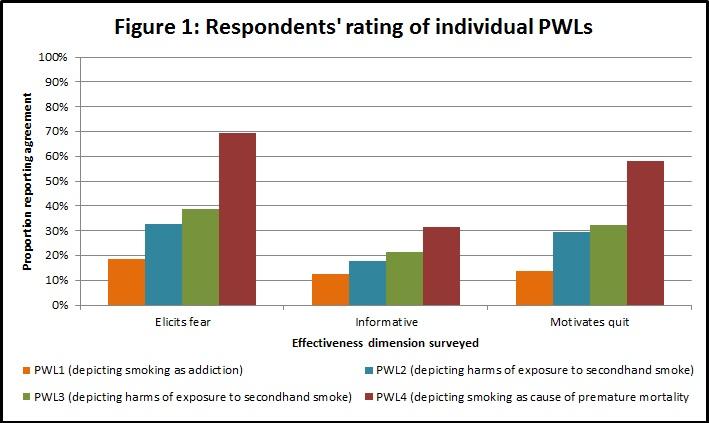Recent manuscripts
Archive
Editorial Board
Aims and Scope
Open Access
Indexing
Contact us
Authorship & COI
Principles of Transparency Checklist
Publication Ethics
Crossmark
Data Policies
Supporting Diversity
Instructions to authors (PDF)
Manuscript Types
Manuscript Formatting
How to submit
Special Publications & Reprints
Preprints
Pictorial warning labels in Jordan: are we maximizing the benefit for smokers?
1
King Hussein Cancer Center, Jordan
Publication date: 2018-03-01
Tob. Induc. Dis. 2018;16(Suppl 1):A211
KEYWORDS
TOPICS
ABSTRACT
Background:
Pictorial warning labels (PWLs) motivate smokers to quit and support continued abstinence. In Jordan, where 70% of adult males smoke, mass media campaigns are non-existent making PWLs of additional importance in communicating the benefits of quitting and prompting quit attempts.
Methods:
We conducted an evaluation of the PWLs used in Jordan after having them in circulation for 2.5 years. We surveyed a cross-sectional convenience sample of smokers aged 17-26 years (n=309). Respondents were asked about: previous quit attempts, beliefs in the need for PWLs and for more information within PWLs, frequency of noticing PWLs and recall of PWL messages, and considering quitting in response to PWLs. Finally, they were prompted with individual PWLs, and requested to rate each on its ability to evoke fear, add information, and motivate quitting.
Results:
Results indicate that:
- 49% (150/309) of the respondents have had a failed quit attempt in the 12 months preceding the survey
- 48% (149/309) of the respondents believe there is a need for PWLs, among which 54% (81/149) believe that PWLs should provide more information
- 63% (195/309) of the respondents noticed PWLs frequently in the month preceding the survey, among which 86% (168/195) correctly recalled at least one PWL message
- 36% (71/195) of those reporting frequent notice of PWLs also report considering quitting in response to PWLs
Respondents' rating of the individual PWLs is depicted in Figure 1.

[Figure 1]
Conclusions:
In Jordan, smokers seem to believe PWLs are necessary and seem to be affected by them to the extent of considering quitting. Yet, given the rate of failed quit attempts, and in light of the request for more information in PWLs, authorities in Jordan should consider supplementing PWLs with content to support self-efficacy to quit, such as including information on the available cessation services and behavioral tips for unaided quitting.
Pictorial warning labels (PWLs) motivate smokers to quit and support continued abstinence. In Jordan, where 70% of adult males smoke, mass media campaigns are non-existent making PWLs of additional importance in communicating the benefits of quitting and prompting quit attempts.
Methods:
We conducted an evaluation of the PWLs used in Jordan after having them in circulation for 2.5 years. We surveyed a cross-sectional convenience sample of smokers aged 17-26 years (n=309). Respondents were asked about: previous quit attempts, beliefs in the need for PWLs and for more information within PWLs, frequency of noticing PWLs and recall of PWL messages, and considering quitting in response to PWLs. Finally, they were prompted with individual PWLs, and requested to rate each on its ability to evoke fear, add information, and motivate quitting.
Results:
Results indicate that:
- 49% (150/309) of the respondents have had a failed quit attempt in the 12 months preceding the survey
- 48% (149/309) of the respondents believe there is a need for PWLs, among which 54% (81/149) believe that PWLs should provide more information
- 63% (195/309) of the respondents noticed PWLs frequently in the month preceding the survey, among which 86% (168/195) correctly recalled at least one PWL message
- 36% (71/195) of those reporting frequent notice of PWLs also report considering quitting in response to PWLs
Respondents' rating of the individual PWLs is depicted in Figure 1.

[Figure 1]
Conclusions:
In Jordan, smokers seem to believe PWLs are necessary and seem to be affected by them to the extent of considering quitting. Yet, given the rate of failed quit attempts, and in light of the request for more information in PWLs, authorities in Jordan should consider supplementing PWLs with content to support self-efficacy to quit, such as including information on the available cessation services and behavioral tips for unaided quitting.
Share
RELATED ARTICLE
We process personal data collected when visiting the website. The function of obtaining information about users and their behavior is carried out by voluntarily entered information in forms and saving cookies in end devices. Data, including cookies, are used to provide services, improve the user experience and to analyze the traffic in accordance with the Privacy policy. Data are also collected and processed by Google Analytics tool (more).
You can change cookies settings in your browser. Restricted use of cookies in the browser configuration may affect some functionalities of the website.
You can change cookies settings in your browser. Restricted use of cookies in the browser configuration may affect some functionalities of the website.

